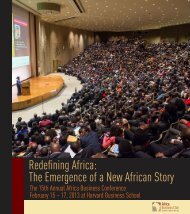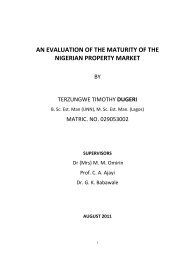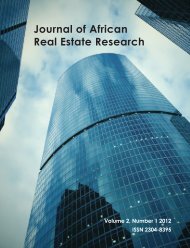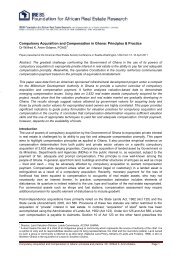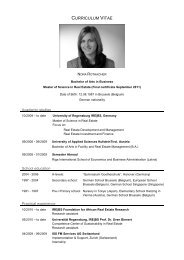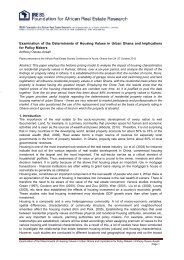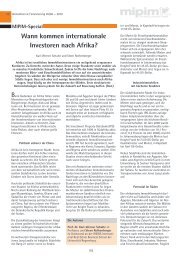Create successful ePaper yourself
Turn your PDF publications into a flip-book with our unique Google optimized e-Paper software.
56Registration;publish the name of the company and its articles on theOfficial Gazette;register the company with the competent Tax Departmentto obtain the respective tax number (NUIT);obtain relevant licenses from the relevant authorities forthe intended area of business activity.Exchange ControlsThe entry of foreign currency and other forms of foreignremittance into Mozambique is permitted provided that anyamount exceeding US$5000 is declared to the Bank ofMozambique prior to entering Mozambique. The realization ofany type of foreign exchange transaction (i.e. any transactionbetween a resident and a non-resident that results, may result oris deemed by law to result in a payment to or receipt fromoutside Mozambique) requires the authorization from andmandatory registration with the Bank of Mozambique.TaxationCorporate Income Tax (IRPC) is a direct tax levied on income.Commercial companies with a head office or effectivemanagement in Mozambique are considered to be IRPCtaxpayers and are subject to IRPC at 32%. The income of foreignentities arising from inside Mozambique is also subject to IRPC,usually at 20%.Monetary PolicyThe main objective of monetary policy in Mozambique is toreduce inflation. Since 2004, the Bank of Mozambique has madereforms to strengthen monetary management through dailyliquidity forecasting and the use of foreign exchange andTreasure Bill Sales. The government’s tight control of spendingand the money supply, combined with financial sector reform,successfully reduced inflation from 70% in 1994 to an estimated4.21% in 2009. The inflation rate in <strong>2012</strong> is expected to be 5.6%according to the Mozambique Central Bank.Legal SystemMozambique’s legal system is based on Roman and German law.The courts have exclusive jurisdiction to settle disputes byjudicial means unless the parties have agreed to submit adispute to arbitration. The state court operates according to theprinciple of the separation of powers and are classified assovereign bodies under the Constitution of the Republic. The lawdifferentiates between judicial courts, administrative courts andother special courts set up by law.The judicial courts include the Supreme Court, The SupremeAppeal Courts, the Provincial Courts and the Districts Courts.The administrative court has special jurisdiction since it hearsclaims arising from disputes in legal administrative relationships,litigation appeals lodged against the decisions of state bodiesand agents and appeals lodged against tax and customs courtdecisions.Intellectual PropertyProtection of Intellectual Property is guaranteed by law.Treaties and Bilateral AgreementsMozambique has signed investmentpromotion and reciprocal protectionagreements with South <strong>Africa</strong>, Germany,Algeria, Belgium, China, Cuba, Denmark,Egypt, USA, Finland, France, Indonesia, Italy,Mauritius, Netherlands, Portugal, Sweden,United Kingdom, Vietnam, India, Switzerland and Zimbabwe.Mozambique has also signed agreements to prevent doubletaxation and fiscal evasion with Portugal, Mauritius, United ArabEmirates, Macau and South <strong>Africa</strong>.In June 1998 Mozambique became signatory to the 1958 NewYork Convention, on the Recognition and Enforcement ofForeign Arbitral Awards.Membership of International and Regional OrganizationsMozambique is a member of the Southern <strong>Africa</strong>n DevelopmentCommunity (SADC), <strong>Africa</strong>n Union (AU), United Nations (UN),Community of Portuguese Language Countries (CPLP), BritishCommonwealth, <strong>Africa</strong>n Countries of Portuguese OfficialLanguage (PALOP), International Monetary Fund (IMF), WorldBank, Food and Agriculture Organisation (FAO), World TradeOrganisation (WTO), World Tourism Organisation and theInternational Labour Organisation (ILO).EnergyMozambique’s vast energy resources have the capacity to satisfymost of its domestic energy needs. They include hydropower(the Cahora Bassa Dam), natural gas, coal, biomass, solar andwind. The country has considerable hydropower potential(especially in the Zambezi River basin at sites such as CahoraBassa and Mphanda Nkuwa) which has been broadly estimatedat 12 500 MW with a corresponding annual energy generationpotential of 60 000 GWh.The country has expanded its energy generation capacity tomore than 16 000 MW as a result of the commercial extraction ofnatural gas (the Pande gas fields), the rehabilitation andconstruction of new hydroelectric dams and the exploitation ofalternative and renewable energies such as solar, oleic, andbiofuels (bioethanol, biodiesel and biogas). The energy sectorhas been liberalised to allow private participation and the sectoroffers a major investment opportunity.TelecommunicationsAlthough the State owned TDM (Telecommunication deMozambique) still enjoys a de facto monopoly, thetelecommunications sector was liberalised by law in 2004 andthe mobile sub-sector has experienced significant growth.MiningMozambique has significant investment opportunities for theexploration, extraction, processing and utilization of natural gas,coal, gold, titanium, ilmenite, zircon, rutile, tantalite, marble andprecious stones.AgricultureMozambique exports baby-corn, flowers, citrus, cashew nuts,various fruit, pepper and paprika and there are opportunities forthe production of cereals, fruit, flowers and vegetables for thelocal and export market.Labour RelationsThere are laws which regulate the employment relationship andthe employment of foreign workers. In 2007, a new labour lawwas approved which made significant reforms (although somedifficulties still exist especially in relation to dismissalprocedures and costs). The registration of employees and theiremployers with the National Security System is mandatory since2009. The Commission for Mediation and Arbitration deals withlabour disputes.



